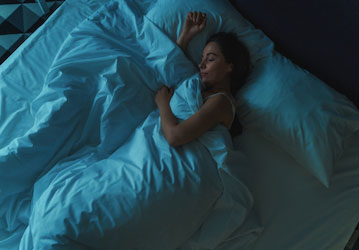One size doesn’t fit all when it comes to sleep. Each of us has a different ideal sleep environment, time, and length that helps us feel well-rested and energized. So, how do you know how much sleep is right for you? Most people don’t know or just go by the standard of 8 hours. What if that isn’t enough for you, or what if it’s too much, and you’re up at night stressing about not getting enough sleep—when really you only need 7 hours?
While sleep experts recommend 7–9 hours for most adults ages 18–64, some people might need an hour less or more. Try this sleep self-study to find out your optimal sleep pattern.
Sleep self-study
- Find a week when you can sleep as long as you need each night, without using an alarm to wake up. It might be best to try this when you’re on leave, which is why this strategy is often called a “sleep vacation.”
- For the entire week, avoid alcohol and caffeine after 2 p.m.
- At around 2000 (8:00 p.m.), stop activities that will artificially keep you awake such as work, social events, etc. Dim the lights and try to avoid exposure to blue light.
- Go to sleep when you get tired and sleep as long as you can to feel rested.
- Track your sleep length as well as your wake and sleep times throughout the week. Try using HPRC’s Sleep Diary to track your patterns.
- You might sleep longer earlier in the week to make up a sleep debt. But by the end of the week, you should start to discover your sleep sweet spot: how long your body needs to sleep to feel rested, and what time your body is naturally ready to go to sleep.
- Now that you know your sleep sweet spot, make it a priority to get your right length of sleep, ideally at a time that’s best for you. If that’s not possible, then backwards plan from the time you need to wake up so that you’re at least getting your ideal length of sleep.
Why sleep is critical for performance optimization and military wellness
If you can be an expert in anything, why not become an expert in yourself? What makes you perform at your best and what causes you to fall short? Sleep is critical for everyone to maximize their performance. Here’s a Total Force Fitness summary of the impact of sleep loss.
- Sleep loss hinders your brain function and response time.
- It decreases your working memory and makes it hard to focus.
- Sleep loss lowers your situational and battlefield awareness.
- Sleep loss makes it harder to accurately interpret people’s facial expressions and communicate effectively.
- It can lower your ability to understand where others are coming from and make you more likely to assume negative intentions.
- Sleep loss can decrease motivation to stick with workout plans, hinders physical performance, and increases your chances for injury.
- Sleep loss can make you more likely to crave unhealthy foods.
- It can lower your self-regulation, which can make it harder to live according to your values.
- Sustained sleep loss can have a severe impact on your long-term health and make you more likely to get sick.
Unfortunately, you can’t make yourself fall asleep, and sometimes the harder you try, the more you stay awake. Luckily, your body is designed to get the rest it needs, but it’s crucial to take the time to really understand how to set yourself up for success to get your optimal amount of sleep.
Take HPRC’s sleep self-reflection quiz and read our article on why sleep is critical for military performance to learn more.

